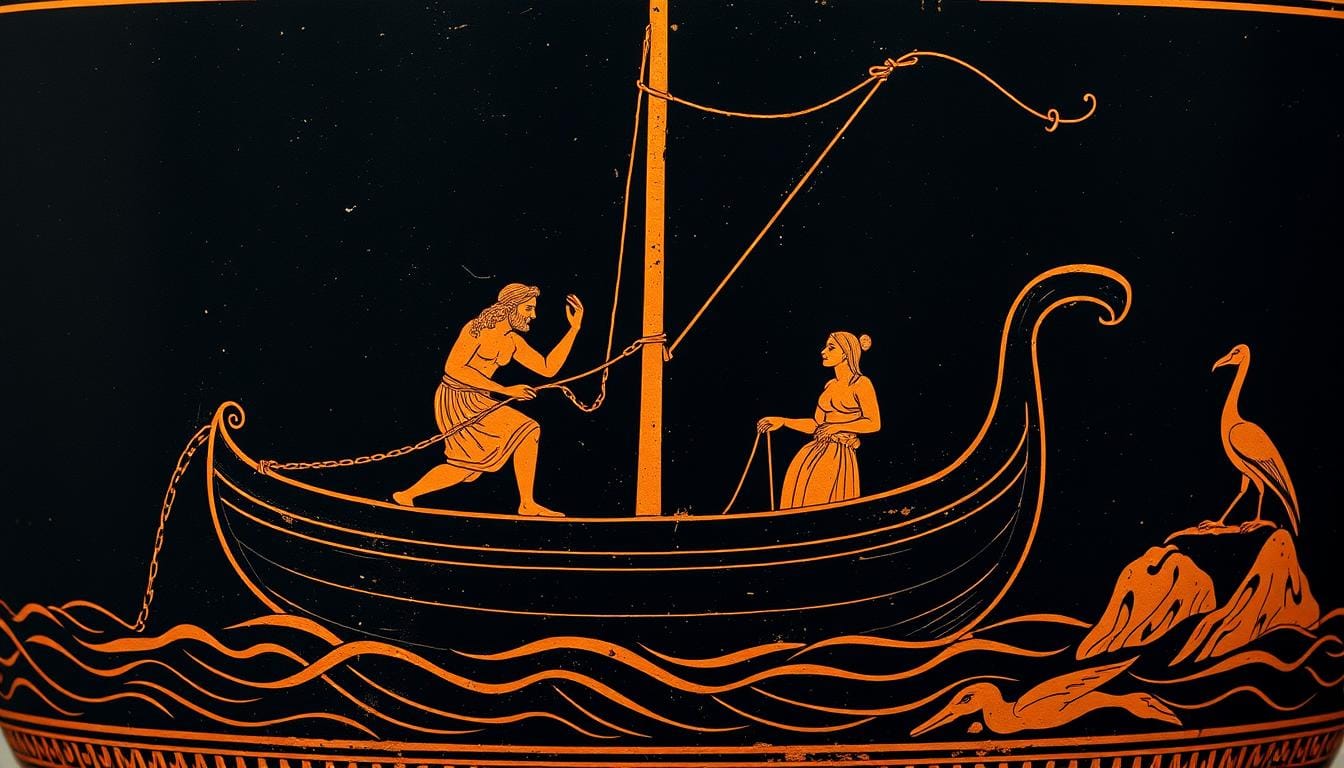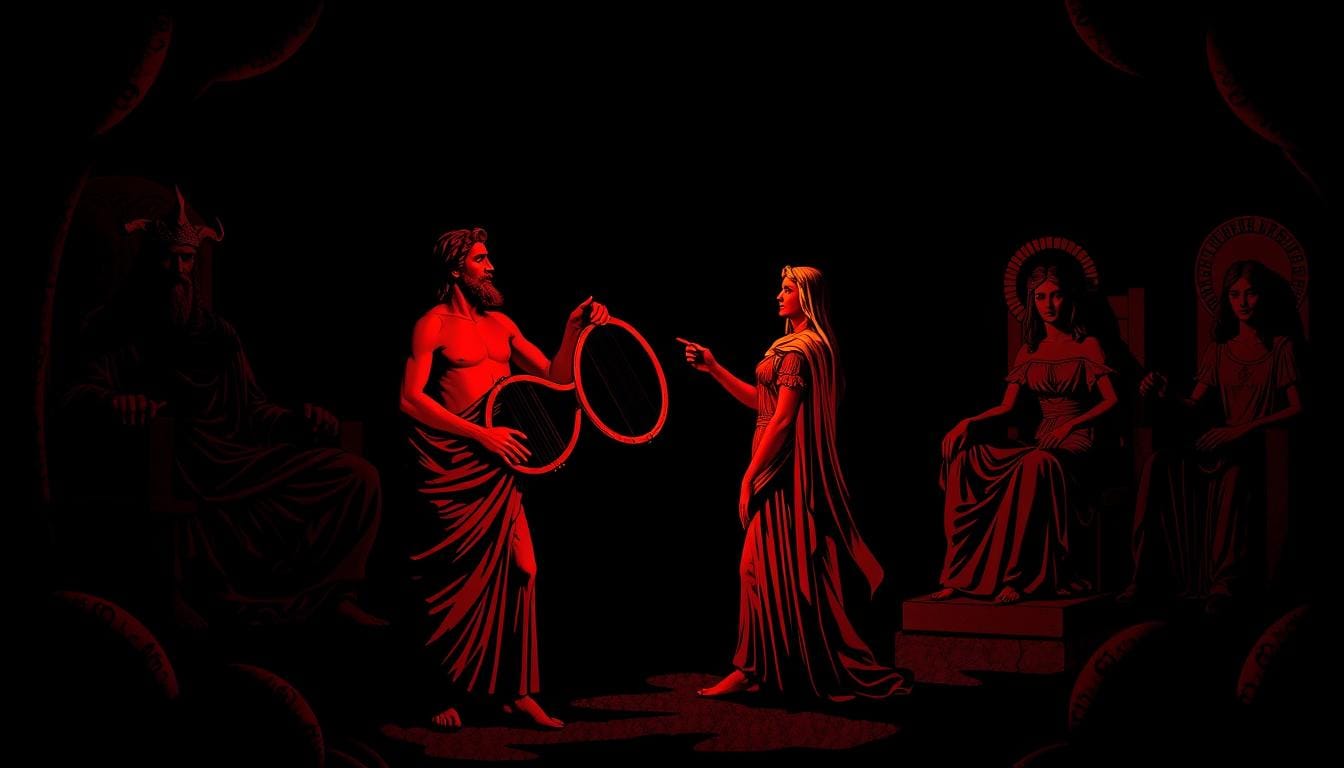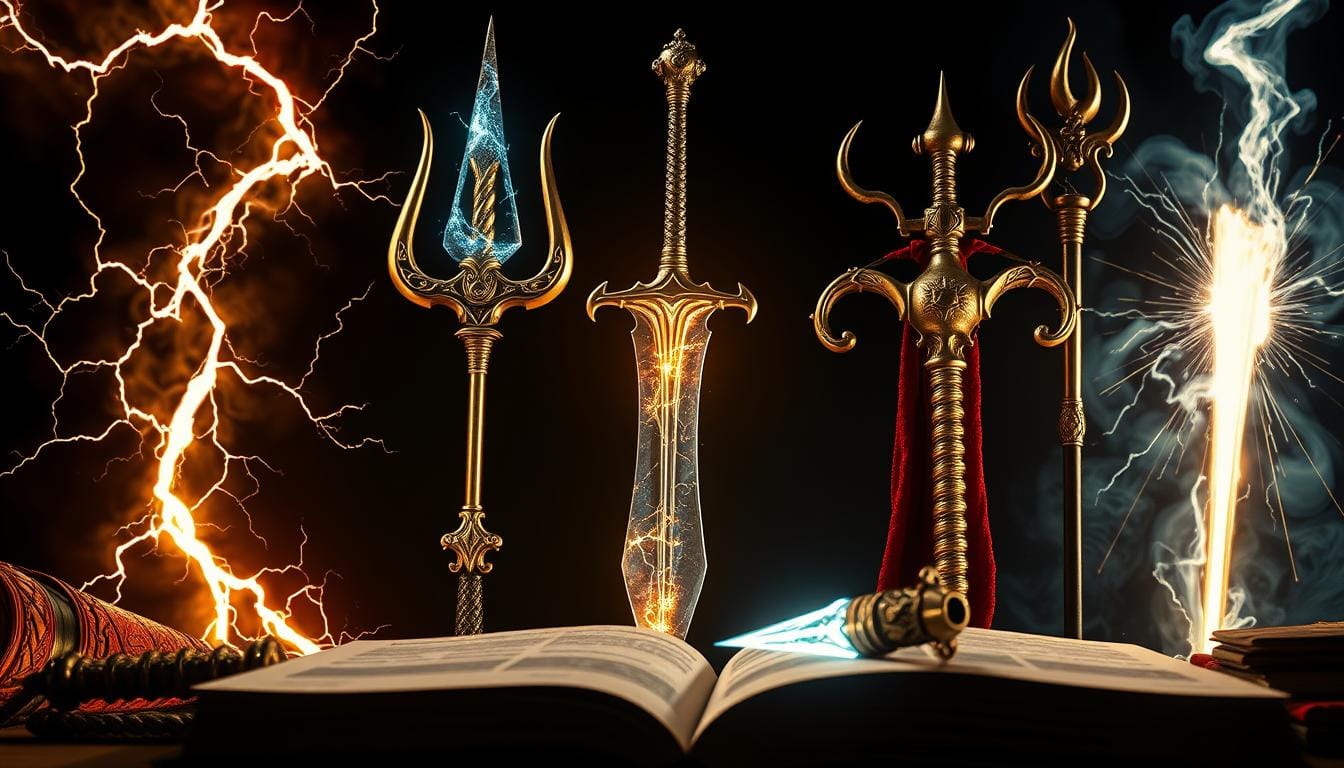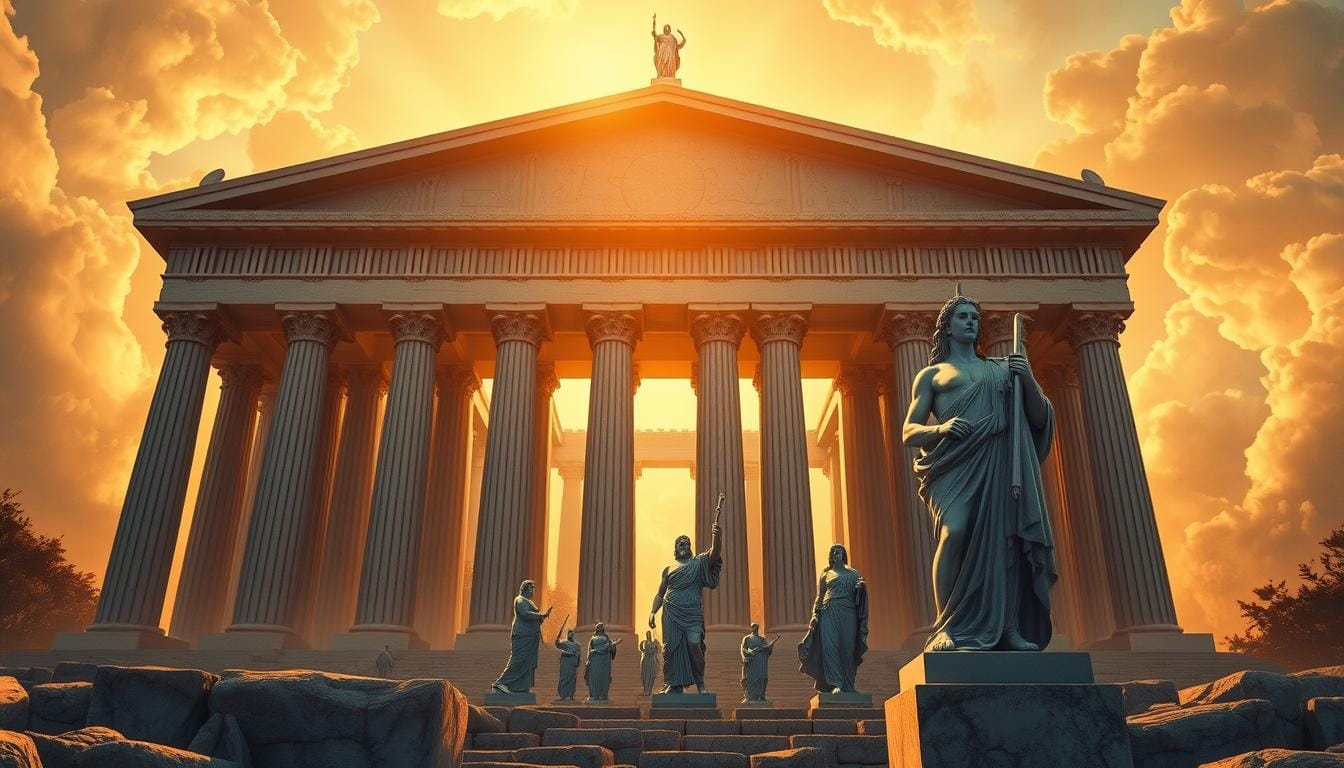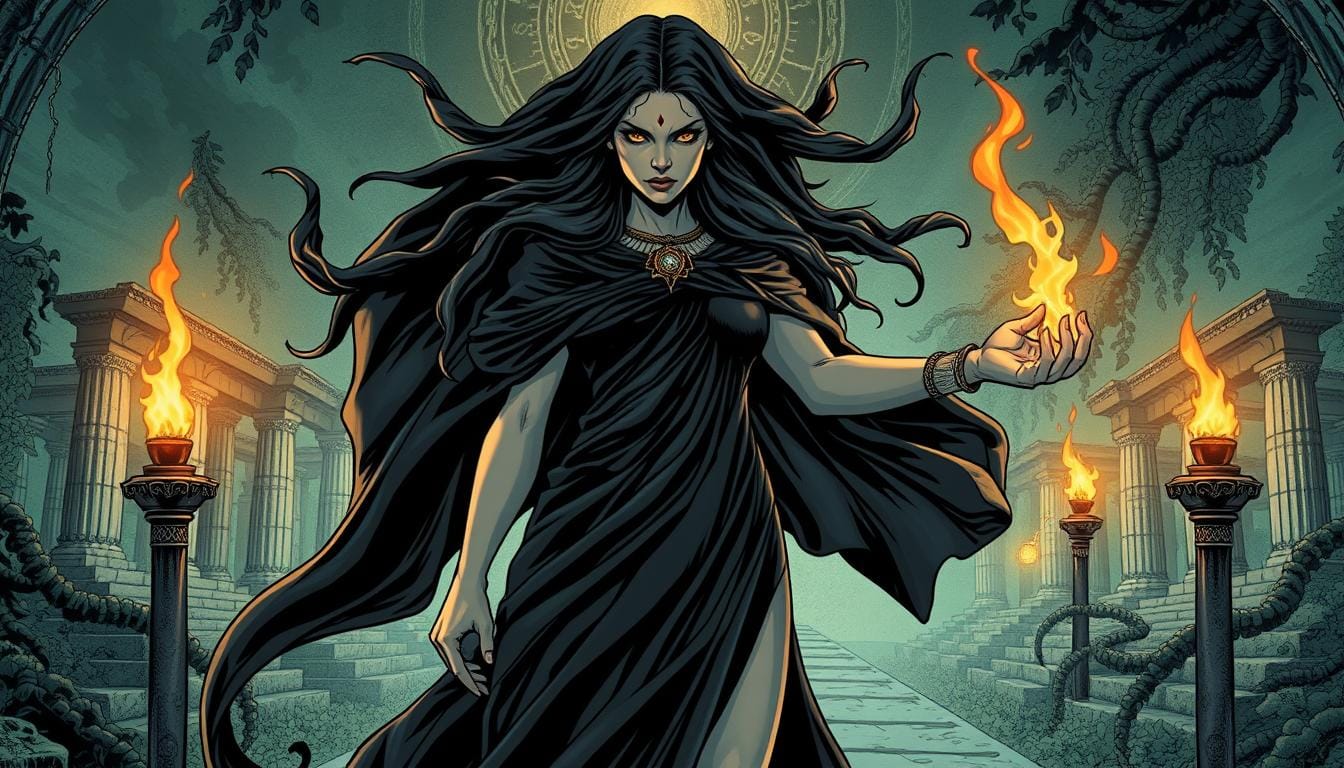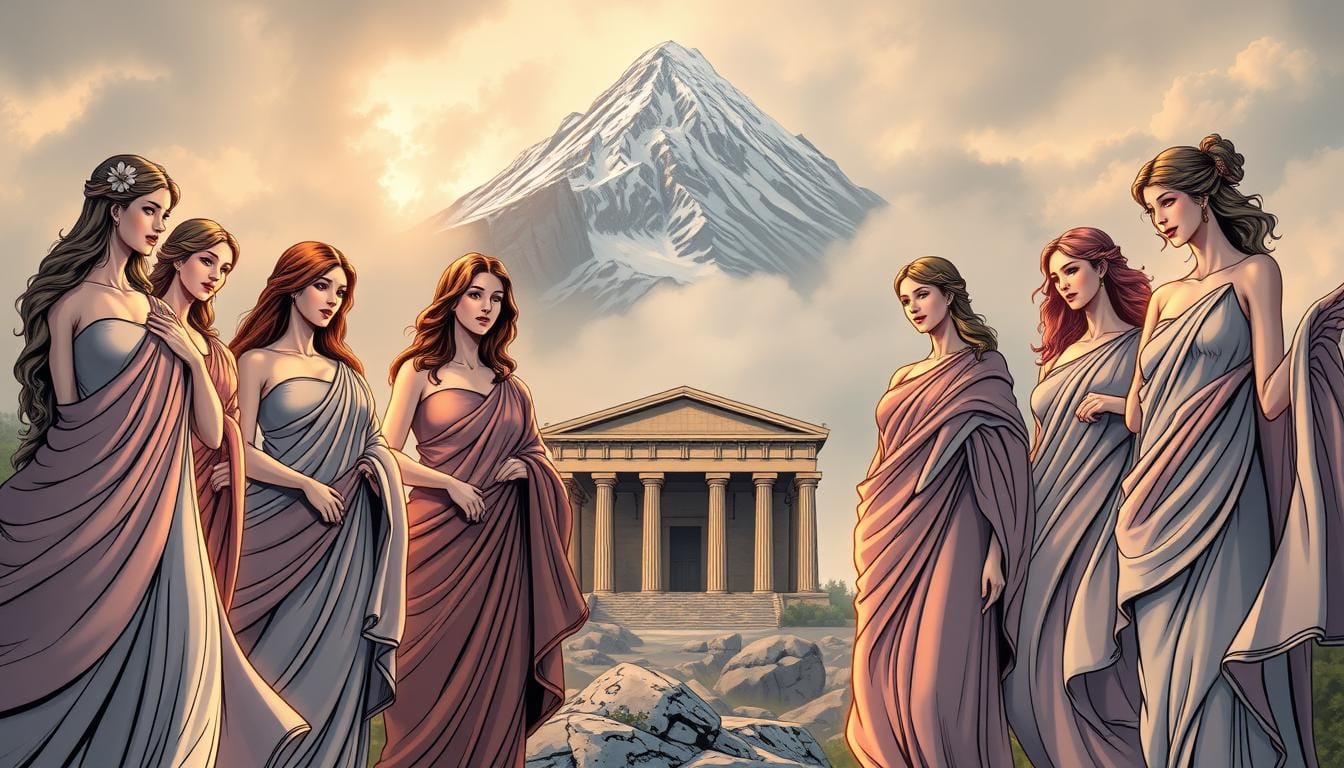In the rich tapestry of Greek mythology, few figures captivate the imagination quite like Orpheus, the legendary musician whose melodies could charm even the most fearsome creatures and move the very stones to tears. His extraordinary musical gifts, tragic love story, and daring journey into the Underworld have inspired countless works of art, literature, and music throughout the centuries. This tale of divine talent, profound love, and heartbreaking loss continues to resonate with audiences today, offering timeless insights into the human condition and the transformative power of art.
The Divine Origins of Orpheus
Orpheus charming animals with his divine music
Born to the Muse Calliope and the Thracian king Oeagrus (though some versions claim Apollo as his father), Orpheus inherited extraordinary musical talents that transcended mortal abilities. As the son of the Muse of epic poetry, he was destined for greatness from birth, embodying the perfect union of divine inspiration and human creativity.
The Gift of Music
Orpheus’s musical prowess was unparalleled in the ancient world. The Greek poet Simonides of Ceos wrote that Orpheus’s music could “charm the birds, fish and wild beasts, coax the trees and rocks into dance, and divert the course of rivers.” This wasn’t mere poetic exaggeration—in Greek mythology, Orpheus’s music literally possessed supernatural power.
“With his songs, Orpheus, the bard of Thrace, allured the trees, the savage animals, and even the insensate rocks, to follow him.” — Ovid, Metamorphoses
Apollo himself, impressed by Orpheus’s natural talent, gifted him a golden lyre and taught him to play with even greater skill. Under the god’s tutelage, Orpheus refined his abilities until his music became so powerful it could influence not just the living world, but eventually even the rulers of the dead.
Discover More Greek Heroes
Want to explore more fascinating figures from Greek mythology? Learn about the twelve labors of Heracles, the cunning of Odysseus, and other legendary heroes.
The Tragic Love Story of Orpheus and Eurydice
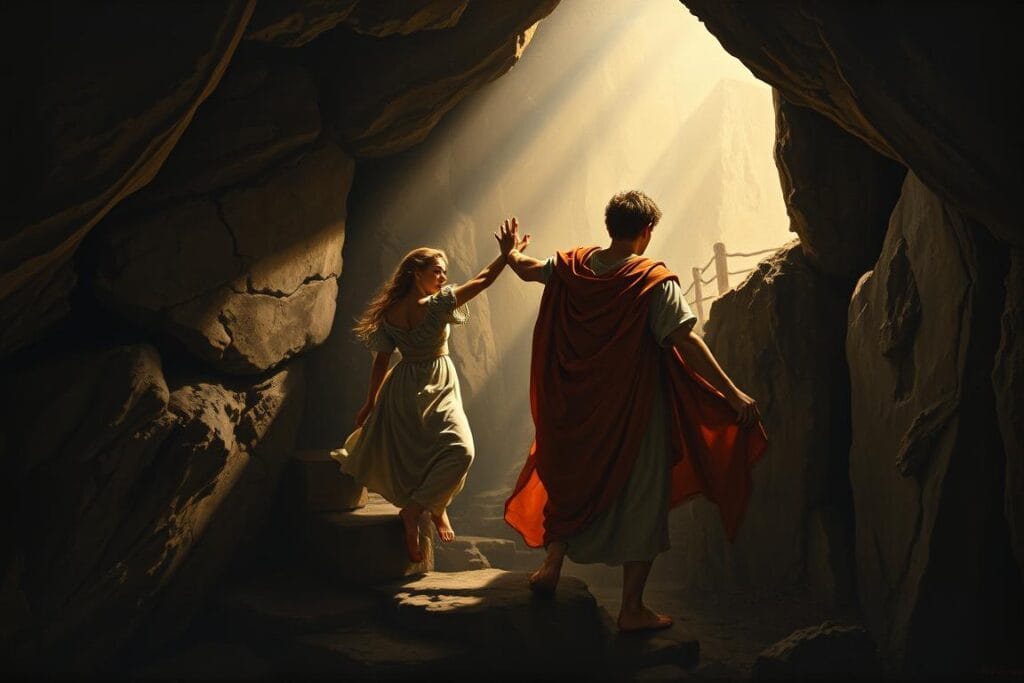
The fateful moment when Orpheus looked back at Eurydice
Among all of Orpheus’s accomplishments, none is more famous than his tragic love story with the nymph Eurydice. Their tale represents one of mythology’s most poignant explorations of love, loss, and the boundaries between life and death.
A Wedding Day Tragedy
Shortly after their wedding, Eurydice was walking through a meadow when she was bitten by a venomous snake. In Virgil’s version, she was fleeing from Aristaeus, who was attempting to assault her when she stepped on the deadly serpent. Regardless of the circumstances, the bite proved fatal, and Eurydice was transported to the Underworld, leaving Orpheus devastated.
In his overwhelming grief, Orpheus played such sorrowful melodies that all of nature mourned with him. The gods themselves were moved by his music and suggested an unprecedented solution: Orpheus should journey to the Underworld and attempt to bring Eurydice back to the land of the living.
The Descent into the Underworld
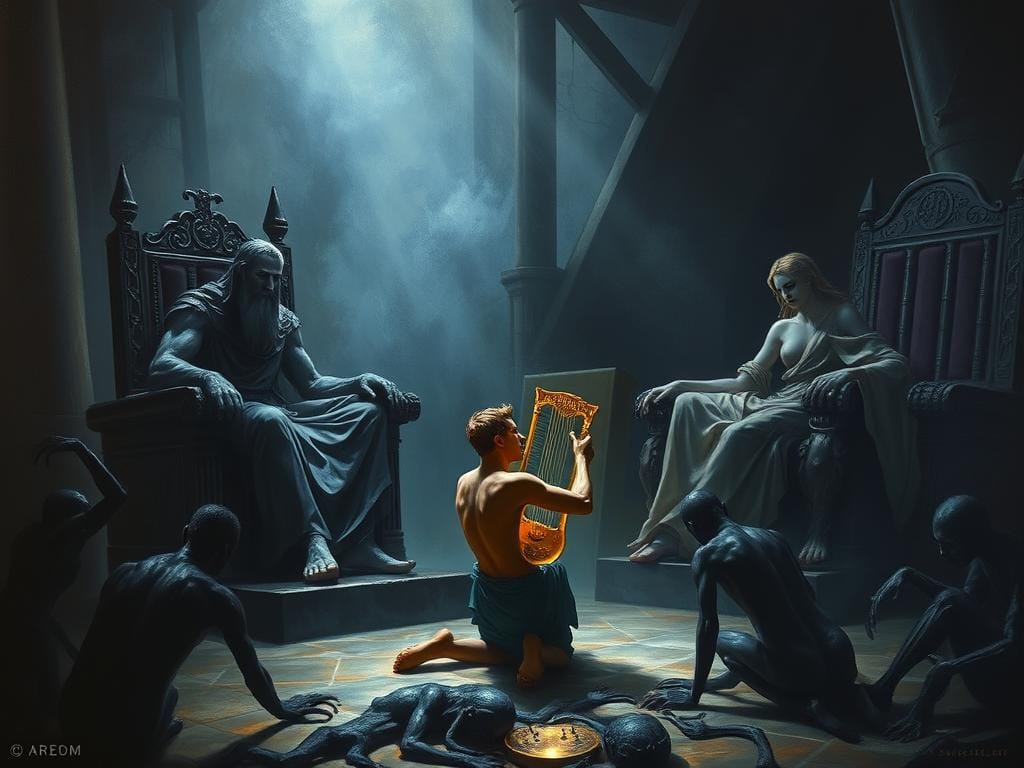
Orpheus performing before Hades and Persephone
Armed only with his lyre and voice, Orpheus descended into the realm of Hades. His journey through the Underworld became legendary—he charmed the ferryman Charon to carry him across the River Styx, lulled the three-headed dog Cerberus to sleep, and moved even the souls of the damned with his music.
“The very ghosts were weeping, and the bloodless spirits. Tantalus no longer reached for the retreating water, Ixion’s wheel stood still in wonder, the vultures ceased to tear at Tityos’s liver, and you, Sisyphus, sat listening on your stone.” — Ovid, Metamorphoses
When Orpheus finally reached the thrones of Hades and Persephone, rulers of the Underworld, he played a melody so moving that even these implacable deities were affected. Persephone, perhaps remembering her own forced separation from the upper world, convinced Hades to grant Orpheus’s request—with one crucial condition.
The Fatal Look Back
Hades agreed to release Eurydice, but with a single stipulation that would prove devastating: as Orpheus led her back to the world of the living, he must not look back at her until they had both completely exited the Underworld. This test of faith and patience would determine whether their reunion would be permanent.
As they neared the exit, with sunlight visible ahead, Orpheus was overcome with doubt. Had Hades tricked him? Was Eurydice truly behind him? In a moment of weakness or overwhelming love—depending on the interpretation—Orpheus turned to look at his wife before she had crossed the threshold. In that instant, Eurydice was pulled back into the depths of the Underworld, this time forever.
Interpretations of Orpheus's Look Back
- A failure of trust and faith
- A symbol of human impatience
- An allegory for the impossibility of cheating death
- A representation of doubt undermining achievement
Alternative Views
- An act of overwhelming love
- A deliberate choice to join Eurydice in death
- A test designed to be impossible by the gods
- A metaphor for memory’s inability to truly preserve what is lost
The Symbolism of Orpheus's Lyre and Music
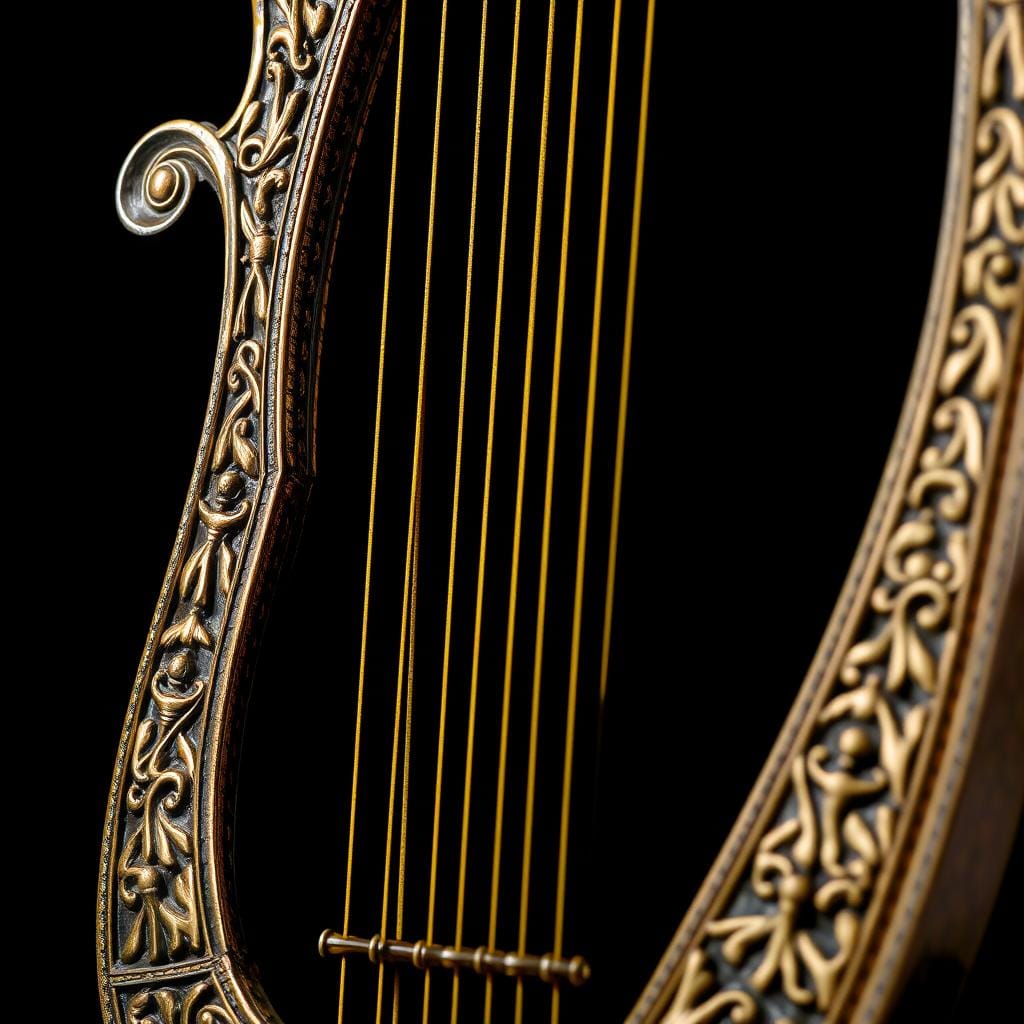
The lyre of Orpheus, symbol of divine music
In ancient Greek culture, Orpheus’s lyre represented far more than a mere musical instrument—it symbolized the transformative and civilizing power of art itself. The lyre was believed to have been invented by Hermes, who fashioned it from a tortoise shell, but it was Orpheus who elevated the instrument to its highest potential.
Music as a Bridge Between Worlds
Orpheus’s music served as a bridge between different realms of existence. It connected the mortal world with the divine, the rational with the emotional, and ultimately, the living with the dead. This bridging function made Orpheus a liminal figure in Greek mythology—someone who could traverse boundaries that were normally impermeable.
The power of his music to affect even inanimate objects like stones and rivers suggested that art could reveal the hidden consciousness in all things. This concept was revolutionary in ancient Greek thought and influenced the development of philosophical ideas about the nature of reality.
The Civilizing Power of Music
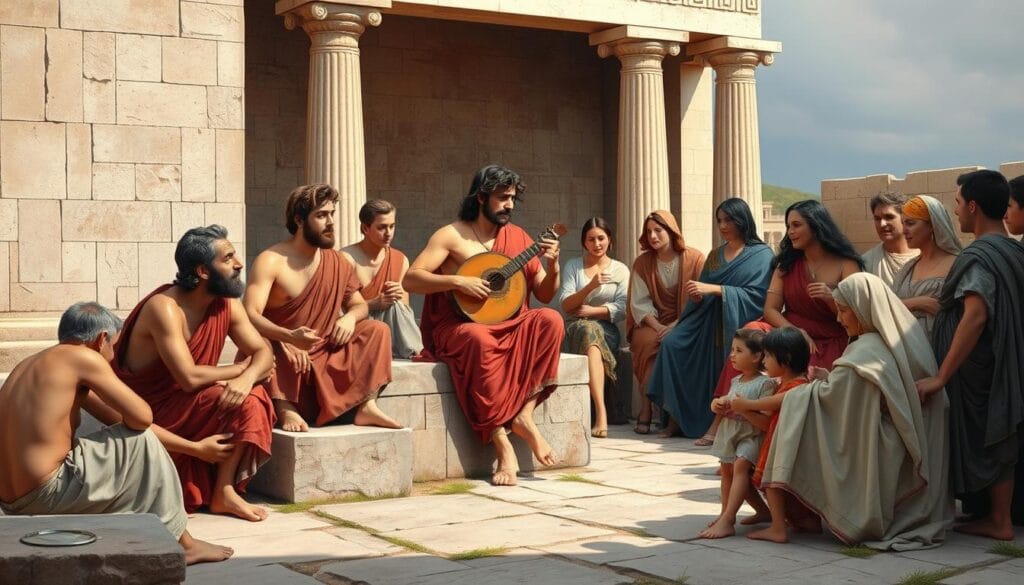
Orpheus sharing the civilizing power of music
According to Horace, Orpheus “made lions and tigers obedient to him” and taught “cannibals to subsist on fruit.” This metaphorically expressed the Greek belief that music and poetry could tame humanity’s savage instincts and elevate society toward civilization and harmony.
In the Argonautica, Orpheus’s music prevented the Argonauts from being lured to their deaths by the Sirens—his beautiful melodies overpowered their deadly songs. This episode illustrates how art could serve as protection against dangerous influences and guide people toward virtue.
“He is mentioned once only, but in an important passage, by Aristophanes, who enumerates, as the oldest poets, Orpheus, Musaeus, Hesiod, and Homer, and makes Orpheus the teacher of religious initiations and of abstinence from murder…” — Ancient Greek sources
The Orphic Mysteries
Beyond his musical abilities, Orpheus was credited with founding religious mysteries that bore his name. The Orphic mysteries were esoteric religious practices that offered initiates special knowledge about the afterlife and purification rituals to ensure a better fate after death.
These mysteries were connected to Orpheus’s unique experience of visiting the Underworld and returning. His journey gave him special insight into death and rebirth, which he shared through religious teachings that influenced Greek religious thought for centuries.
Explore Ancient Greek Music
Curious about the actual sounds of ancient Greek music? Discover reconstructions of ancient instruments and compositions based on historical evidence.
The Enduring Legacy of Orpheus
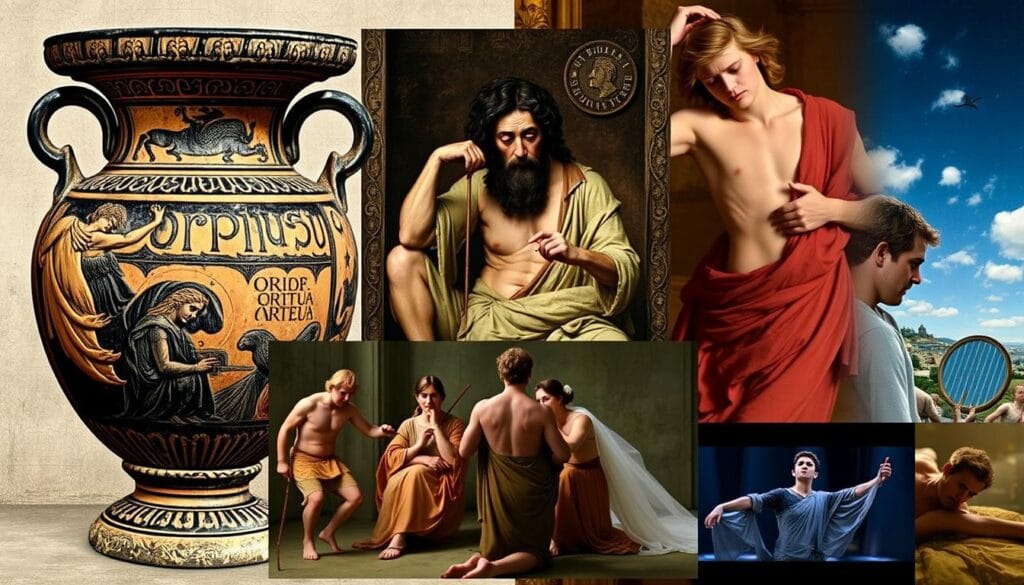
Orpheus’s influence across art forms and centuries
Few mythological figures have inspired as much artistic creation as Orpheus. His story has been continuously reinterpreted and reimagined from ancient times to the present day, demonstrating the enduring power of this archetypal musician and his tragic tale.
Orpheus in Literature and Poetry
The earliest literary references to Orpheus date back to the 6th century BCE, but his influence on literature has never waned. Virgil and Ovid both gave powerful accounts of his story in Roman times. In the 20th century, poets like Rainer Maria Rilke created masterpieces like “Sonnets to Orpheus” (1922) that reimagined the myth for modern sensibilities.
Contemporary authors continue to find inspiration in Orpheus. Margaret Atwood’s “Orpheus and Eurydice Cycle” (1976-1986) and Sarah Ruhl’s play “Eurydice” offer feminist reinterpretations that give Eurydice a more prominent voice in the narrative.
Orpheus in Music and Opera
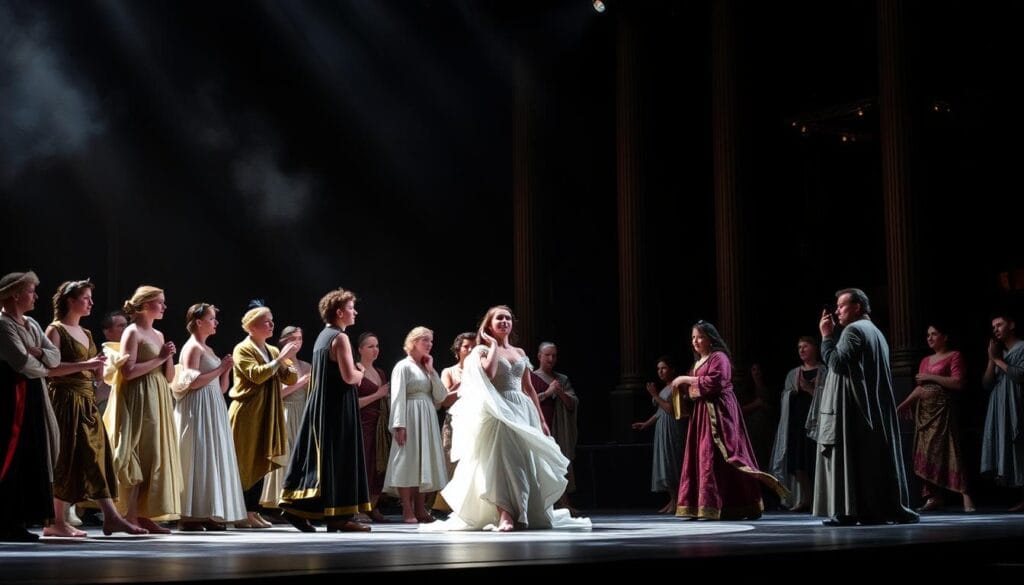
A modern production of Gluck’s “Orfeo ed Euridice”
As the quintessential musician of mythology, Orpheus has naturally inspired countless musical works. The earliest operas drew heavily from his story, establishing the art form itself. Monteverdi’s “L’Orfeo” (1607) is considered one of the first great operas, while Gluck’s “Orfeo ed Euridice” (1762) revolutionized the form.
The musical legacy continues with works like Stravinsky’s ballet “Orpheus” (1948), Philip Glass’s chamber opera “Orphée” (1991), and Anaïs Mitchell’s folk opera “Hadestown,” which won multiple Tony Awards after reaching Broadway in 2019.
| Time Period | Notable Orpheus Works | Medium | Key Innovation |
| Ancient (pre-500 CE) | Orphic Hymns, Orphic Argonautica | Poetry, Religious Texts | Established core mythology |
| Renaissance/Baroque | Monteverdi’s “L’Orfeo” (1607) | Opera | Helped establish opera as an art form |
| Classical/Romantic | Gluck’s “Orfeo ed Euridice” (1762) | Opera | Reformed operatic structure |
| Modern (20th Century) | Cocteau’s Orphic Trilogy (1930-1959) | Film | Surrealist reinterpretation |
| Contemporary | “Hadestown” (2006-2019) | Musical Theater | Folk/jazz fusion, social commentary |
Orpheus in Visual Arts and Film
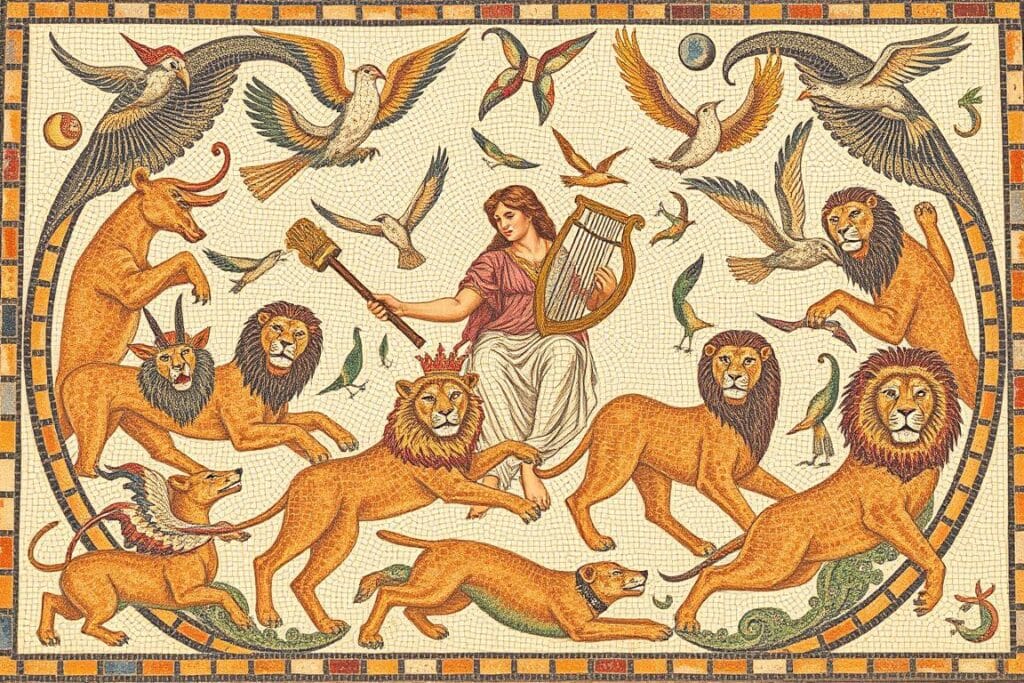
Ancient Roman mosaic of Orpheus charming animals
Visual representations of Orpheus date back to ancient Greek pottery and Roman mosaics, which often depicted him charming animals with his music or during his fateful journey to the Underworld. Renaissance and Baroque painters frequently revisited these scenes, creating emotionally charged interpretations of key moments in the myth.
In cinema, Jean Cocteau’s Orphic Trilogy—”The Blood of a Poet” (1930), “Orpheus” (1950), and “Testament of Orpheus” (1959)—brought surrealist interpretations to the myth. Marcel Camus’s “Black Orpheus” (1959) reimagined the story in the context of Rio de Janeiro’s Carnival, winning both the Palme d’Or and the Academy Award for Best Foreign Language Film.
Lessons from the Myth of Orpheus

The timeless themes of the Orpheus myth
The enduring popularity of the Orpheus myth stems from the universal themes it explores and the profound lessons it offers about the human experience.
The Power and Limitations of Art
Orpheus’s story demonstrates both the extraordinary power of art—his music could charm wild beasts and move the rulers of the Underworld—and its ultimate limitations. Despite his unparalleled artistic gifts, Orpheus could not permanently alter the natural order or overcome death’s finality. This tension between art’s transformative potential and its boundaries continues to resonate with creators and audiences alike.
Love, Loss, and Acceptance
At its heart, the myth of Orpheus is about confronting loss. His journey to the Underworld represents the universal human desire to deny death and reclaim what has been lost. His failure to bring Eurydice back permanently speaks to the necessity of accepting loss as part of the human condition—a painful but essential process of growth.
The “looking back” moment can be interpreted as the difficulty of moving forward while still honoring what has been lost. This delicate balance between remembrance and progress remains one of life’s greatest challenges.
The Transformative Journey
Orpheus’s descent into and return from the Underworld follows the classic hero’s journey pattern found in mythologies worldwide. His experience transforms him, granting special knowledge and insight that he shares through his music and religious teachings. This archetypal journey continues to provide a template for stories about personal transformation and growth through adversity.
Why does the Orpheus myth continue to inspire artists today?
The Orpheus myth endures because it addresses universal human experiences: the power of art, the pain of loss, the desire to transcend death, and the consequences of doubt. These themes remain as relevant today as they were in ancient Greece. Additionally, the story’s dramatic structure—with its clear narrative arc, emotional depth, and tragic conclusion—provides rich material for artistic interpretation across all media.
What does Orpheus's "look back" symbolize in modern interpretations?
In modern interpretations, Orpheus’s fatal backward glance has been variously interpreted as representing doubt, impatience, lack of faith, overwhelming love, or the impossibility of fully reclaiming the past. Contemporary versions often explore this moment as a metaphor for psychological processes like grief, memory, and the difficulty of moving forward while honoring what has been lost. Some feminist reinterpretations focus on Eurydice’s perspective, questioning whether being returned to life was what she wanted at all.
The Immortal Music of Orpheus
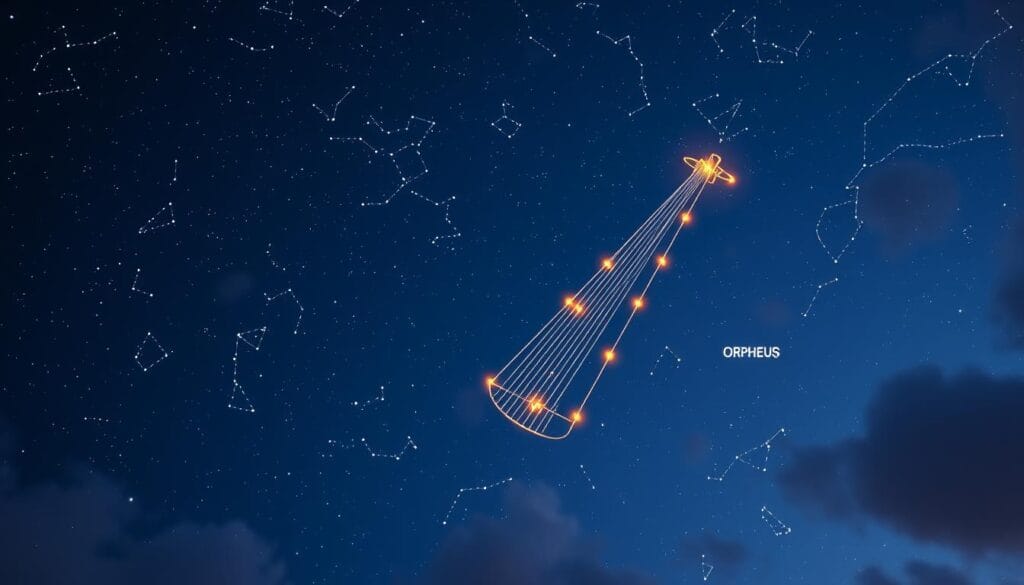
Orpheus’s lyre immortalized among the stars
According to the myth, after Orpheus’s death, the Muses placed his lyre among the stars as the constellation Lyra—a fitting tribute to the musician whose art transcended the boundaries between life and death, mortal and divine. This celestial immortalization symbolizes how truly transformative art lives on long after its creator has departed.
The story of Orpheus continues to enchant us because it speaks to our deepest hopes and fears: that love might be powerful enough to overcome death, that art can transform the world around us, and that even in failure, our creative expressions can achieve a kind of immortality. As we continue to retell and reimagine his journey, we participate in the same tradition that has kept Orpheus’s music playing for thousands of years—proving that, in some sense, he truly did conquer death through the enduring power of his art.
Continue Your Journey Through Greek Mythology
Fascinated by the story of Orpheus? Explore more captivating tales from Greek mythology with our comprehensive guide to the most influential myths and their modern interpretations.
